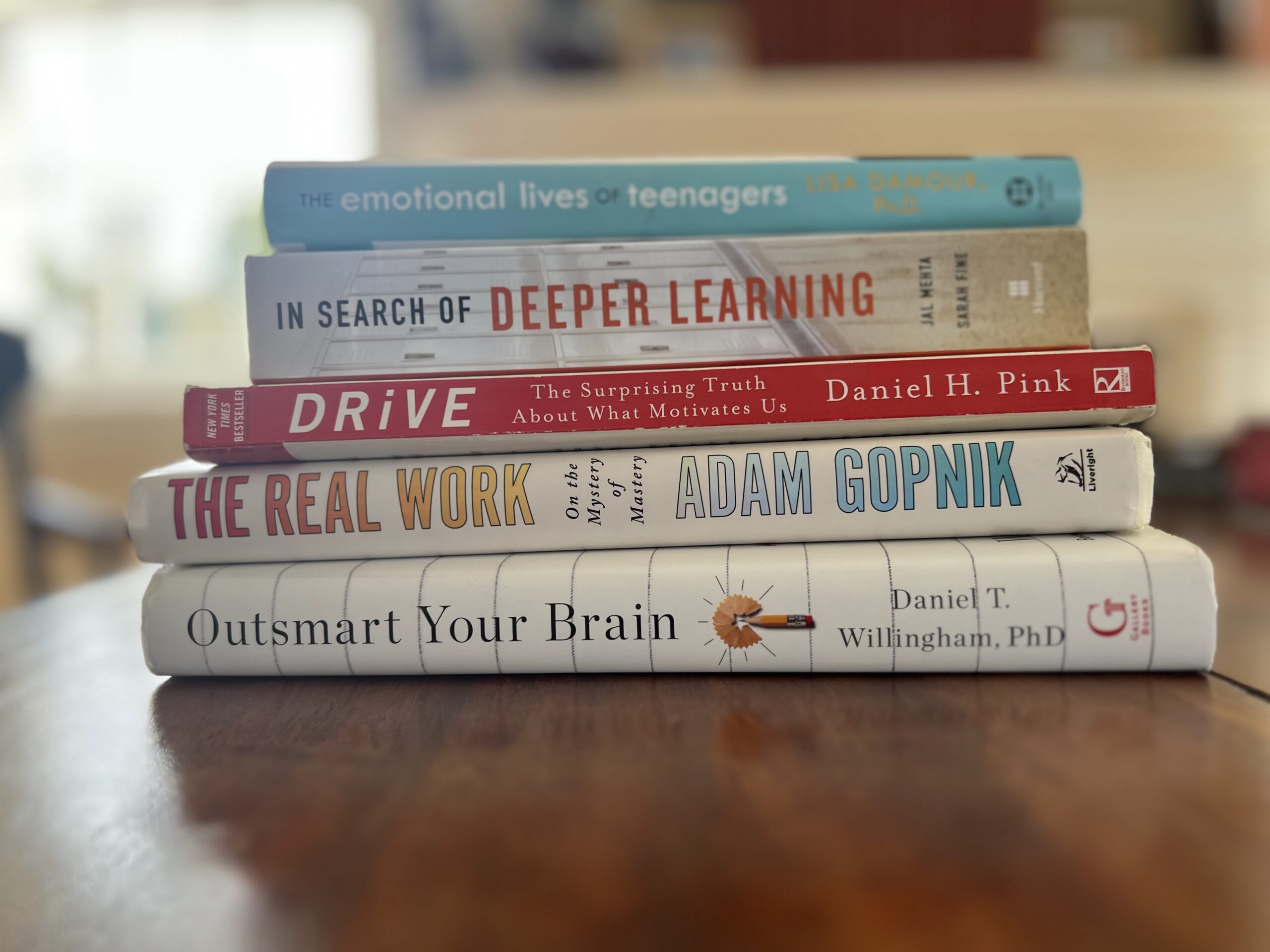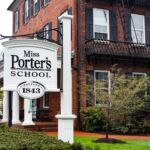By: Timothy Quinn
Chief Academic Officer and Dean of Faculty
One of the most wonderful things about summer, for me, is that I have more time to read. This past summer, every member of our faculty was asked to read one of five books related to different facets of our work with students. Here were their choices:
- “Drive: The Surprising Truth about What Motivates Us,” by Daniel Pink
- “The Real Work: On the Mystery of Mastery,” by Adam Gopnik
- “Outsmart Your Brain: Why Learning is Hard and How You Can Make It Easy,” Daniel Willingham
- “The Emotional Lives of Teenagers: Raising Connected, Capable, and Compassionate Adolescents,” by Lisa Damour
- “In Search of Deeper Learning: The Quest to Remake the American High School,” by Jal Mehta and Sarah Fine
I’d like to share what we learned, and why it’s relevant.
“Drive” changed my whole way of thinking about human motivation when I first read it in 2009. The research it details is now foundational to current thinking about assessment and grading. Pink explains why extrinsic motivators, such as punishment or rewards (i.e. grades), don’t produce lasting motivation. Rather, intrinsic motivation comes from tasks that tap into three things: autonomy, mastery, and purpose. Our faculty have long been practicing this by giving students choice in their work (autonomy), structuring challenges so that they can develop skills (mastery), and providing a curriculum that is meaningful to them (purpose).
In “The Real Work of Mastery,” Adam Gopnik examines the concept of mastery at the highest levels in an eclectic assortment of skills and crafts that include drawing, driving, dancing and baking. Each of these skills provides an interesting parallel for the work our students do in school, as we strive not simply for them to gain knowledge, but to become skilled practitioners within the domains of the various liberal arts. One of the most salient points Gopnik makes is the distinction between accomplishment and “mere” achievement. It is worth quoting him at length here:
We live an achievement-driven society in which kids of all kinds and classes (though in particular fortunate ones from fortunate families) are perpetually being pushed toward the next evanescent achievement instead of the next enduring Accomplishment …. We drive our kids toward achievement, and yet anyone who is a parent of any sensitivity at all recognizes that what really stirs and moves children, just as it stirs and moves ourselves isn’t achievement, isn’t the “A” you get on the test or the score you get on the SATs, however instrumental they may be to some larger ambition. No, what really stirs us is accomplishment, that moment of mastery when suddenly we feel that something profoundly difficult, tenaciously thorny, has given way, and we are now the Master of It, instead of us being mastered by it.
I’d say that seems relevant for students at schools such as Miss Porter’s.
Daniel Willingham’s “Outsmart Your Brain” contains a series of neurological “hacks” that help students develop and employ effective strategies for learning. If you’re looking for a practical book on how to improve performance, this is the one. The underlying idea behind Willingham’s book is that what can often feel like effective strategies for students aren’t that effective. Willingham provides helpful tips on taking notes, studying for tests, managing time and completing projects. These strategies may feel counterintuitive, but Willingham says the research shows that they work.
We shift from academics to mental health with “The Emotional Lives of Teenagers,” by Lisa Damour, an expert on the psychology of teenage girls. As a parent of one teen and one preteen, this book, for me, was by far the most useful of our summer reads, and I strongly recommend it to any parent of teenagers. Damour’s book is centered around what she refers to as the “three big myths of adolescent emotion.” The first myth is that “emotion is the enemy of reason,” the second myth is that “difficult emotions are bad for teens,” and the third myth is that “teens are psychologically fragile.” In short, we should not be afraid of teenage emotions and we should not shield them from challenges, disappointment and sadness. To be emotionally healthy, they must actually be exposed to those things with adults there to support them through.
In “In Search of Deeper Learning: The Quest to Remake the American High School,”Jal Mehta and Sarah Fine provide a sweeping examination of the American high school and the learning that different types of high school facilitate. The title, in my view, captures the journey of change that Miss Porter’s has been on over the last decade as we look, more than anything, to provide students with the deep learning that we know will prepare them for success and happiness in an increasingly complex and ever-changing world. The authors’ research shows that the most successful schools are those that articulate and embrace a clear and consistent institutional vision for teaching and learning. This resonates at Miss Porter’s, where we are successful because we are mission-driven and thus bring a sense of cohesion and purpose to all that we do. Mehta and Fine also name mastery, identity, and creativity as integral to successful schooling. These are concepts that we have taken seriously at Miss Porter’s for a long time and that are now front and center. We help our students work toward mastery, we center their identities, and we push them to use their skills in ways that create solutions to problems.
Take a look at these books if you found my commentary interesting, and always feel free to pass along books you think I might like to read!
Before closing, I would like to add that I am proud that in purchasing these books for faculty, we used Bookshop.org rather than Amazon whenever possible so that we could support local, independent bookstores — particularly the Black-owned Key Bookstore in Hartford, CT.



